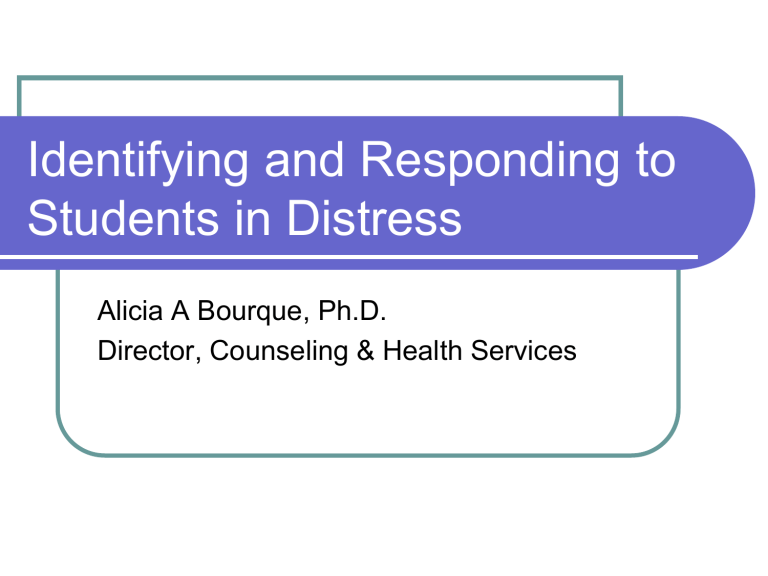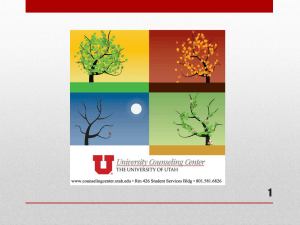Dr. Bourque's Presentation

Identifying and Responding to
Students in Distress
Alicia A Bourque, Ph.D.
Director, Counseling & Health Services
Agenda
Quick facts about College Mental
Health
UCC services and trends
Counseling indications
Disturbing and threatening behavior
Confidentiality
Q & A
Quick Facts about National Trends in
College Students and Mental Health
Nearly half of college students report feeling so depressed that they have trouble functioning.
Suicide is the second leading cause of death for college students.
More students are coming to college with mental health diagnoses. Increased support services provided at a younger age so that academic record is not adversely affected.
UCC Services
Individual, couples, and group counseling
Substance abuse screenings
ADHD evaluations and counseling
Limited psychiatric medication management appointments
24/7/365 after hours crisis counseling
Accessed via LUPD at 504.865.3434
Outreach programming/Res hall adoption
UCC Trends
20% of Loyola’s student population in any given year
Average 3500 appointments per year
Anxiety Disorders
Mood Disorders (e.g., Depression, Bipolar)
ADHD
Partner Relational
Crises
Grief
UCC Response to Increased
Demand
Daily crisis walk-in hour
Suicidal/Homicidal
Recent loss
Recent trauma
Waitlist
Community-based referrals
Increased group offerings
Emotional Wisdom
Sexual Assault Survivors
Indications for Counseling
Changes in Mood or Behavior
Anxiety and Depression
References to Suicide
Violence and Aggression
Traumatic Changes in Personal Relationships
Alcohol and Other Drug Abuse
Academic Problems
Excessive Absences
Poor Hygiene
Crying in class
Repeated requests for special accommodations
Identifying and Responding to
Disturbing and Disruptive Behavior
Can be useful to distinguish between student behavior that is disturbing versus disruptive
Behavior can be both disturbing and disruptive
Threatening behavior
Identifying Disturbing Behavior
A student who jokes in class about killing himself,
A student who perspires profusely when giving a talk in front of class,
A student who discloses that her mother was diagnosed with terminal cancer,
A student who seems to work harder than most students but can’t pass an exam,
A student who appears to be losing significant weight yet speaks with pride about how little he/she eats,
A student whose writing appears disjointed and fragmented, as though he/she cannot maintain a logical sequence in his/her thought process,
A student who reports that FBI agents are following him/her around campus.
Interventions for Disturbing Behavior
Initiate a conversation with the student about the behavior that concerns you
Listen to the student
Consult with other professionals on campus
Refer to the Care & Concern Committee
Robert Reed, 504.865.3737, rareed@loyno.edu
Refer to other professionals on campus
Students with suicide risk factors should be referred for professional help
How to Refer
Get to know the referral sources
Use a direct approach with the student and express your concern for his or her welfare
Anticipate some concerns about seeking counseling
Create a positive expectation
To make an appointment, student can call
504.865.3835 or stop by our office in the Danna
Center, second floor, room 208
Leave the option open, except in emergencies, for the student to accept or refuse counseling
Ask the student at a later date what action he/she has taken
Threatening Behavior
A student who implies or makes a direct threat to harm themselves or others.
A student who displays a firearm or weapon.
A student who physically confronts/attacks another student.
A student who stalks or harasses a faculty member.
A student who sends threatening emails, letters, and other correspondence to a staff member.
Interventions for Threatening
Behavior
Immediately call LUPD at 504.865.3434.
Contact Counseling Director for notification, advice and support at 504.865.3835.
Consult with the UCC to debrief and assist you, staff members and other students.
UCC staff is trained in confidentiality, if you have a concern about sharing information with a counselor, please express it and the counselor can help set the limit.
Quick Facts about the UCC
Staffed by four FT professionals and one PT psychiatrist
No additional charge to students
All counseling services are confidential
Hours of operation are Monday-Friday, 8:30 a.m. - 4:45 p.m.
No session limits
Emergency after-hours crisis services are available on-call through LUPD at
504.865.3434, 24/7/365
Confidentiality
Professional ethics, state and federal law
Faculty members often have an understandable desire to know if a student who has been referred has actually attended and made any progress
Contact Information
Q & A
Alicia A. Bourque, Ph.D.
Director, Counseling & Health Services
504.865.3835
aabourqu@loyno.edu






